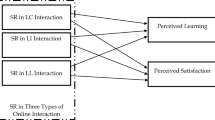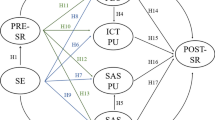Abstract
Being able to utilize information systems (IS) to address novel issues continues to be challenging for many IS users. IS training has typically focused on acquiring requisite knowledge and skills to complete routine sets of tasks, and not necessarily transference of this IS knowledge and skills to novel contexts. Being unable to perform this transference can then limit an IS users ability to utilize an IS to address unique problems. Drawing upon Identical Elements and Principles Theories, as well as Social Cognitive Theory, this research study proposes an experiment to assess the effectiveness of utilizing self-regulation techniques (i.e., self-explanations and self-evaluations) to improve IS knowledge and skills transference to unique contexts as well as improve IS performance outcomes. The potential contribution will include suggestions of training modifications to enhance IS usage and providing guidance for future research in the domain of IS users’ knowledge and skills transference.
Chapter PDF
Similar content being viewed by others
Keywords
References
Azevedo, R.: Computer Environments as Metacognitive Tools for Enhancing Learning. Educational Psychologist 40(4), 193–197 (2005a)
Azevedo, R.: Using Hypermedia as a Metacognitive Tool for Enhancing Student Learning? The Role of Self-regulated Learning. Educational Psychologist 40(4), 199–209 (2005b)
Bandura, A.: Social Learning Theory. Prentice-Hall, New Jersey (1977)
Bandura, A.: Social Foundations of Thought and Action: A Social Cognitive Theory. Prentice Hall, New Jersey (1986)
Bandura, A.: Social Cognitive Theory of Self-regulation. Organizational Behavior and Human Decision Processes 50(2), 248–287 (1991)
Choi, S.Y., Lee, H., Yoo, Y.: The Impact of Information Technology and Transactive Memory Systems on Knowledge Sharing, Application, and Team Performance: A Field Study. MIS Quarterly 34(4), 855–870 (2010)
Compeau, D.: The Role of Trainer Behavior in End User Software Training. Journal of End User Computing 14(1), 23–32 (2002)
Compeau, D., Higgins, C.A.: Application of Social Cognitive Theory to Training for Computer Skills. Information Systems Research 6(2), 118–143 (1995)
Crippen, K.J., Earl, B.L.: The Impact of Web-based Worked Examples and Self-explanation on Performance, Problem Solving, and Self-efficacy. Computers & Education 49(3), 809–821 (2007)
Davis, F., Yi, M.: Improving Computer Skill Training: Behavior Modeling, Symbolic Mental Rehearsal, and the Role of Knowledge Structures. Journal of Applied Psychology 89(3), 509–523 (2004)
Gravill, J.I.: Self-regulated Learning Strategies and Computer Software Training. Doctoral Dissertation, University of Western Ontario, Canada, AAT NR00329 (2004)
Gravill, J., Compeau, D.: Self-regulated Learning Strategies and Software Training. Information & Management 45(5), 288–296 (2008)
Ko, D.-G., Kirsch, L.J., King, W.R.: Antecedents of Knowledge Transfer from Consultants to Clients in Enterprise System Implementations. MIS Quarterly 29(1), 59–85 (2005)
Payne, J.W., Bettman, J.R., Johnson, E.J.: The Adaptive Decision Maker. Cambridge University Press, New York (1993)
Santhanam, R., Seligman, L., Kang, D.: Postimplementation Knowledge Transfers to Users and Information Technology Professionals. Journal of Management Information Systems 24(1), 171–199 (2007)
Schunk, D.H.: Verbal Self-regulation as a Facilitator of Children’s Achievement and Self-efficacy. Human Learning, 265–277 (1982)
Schunk, D.H.: Social Cognitive Theory and Self-regulated Learning. In: Zimmerman, B.J., Schunk, D.H. (eds.) Self-regulated Learning and Academic Achievement, 2nd edn., pp. 125–151. Lawrence Erlbaum Associates Inc., Mahwah (2001)
Schunk, D.H., Cox, P.D.: Strategy Training and Attributional Feedback with Learning Disabled Students. Journal of Educational Psychology 78(3), 201–209 (1986)
Sharma, R., Yetton, P.: The Contingent Effects of Training, Technical Complexity, and Task Interdependence on Successful Information Systems Implementation. MIS Quarterly 31(2), 219–238 (2007)
van Merrienboer, J.J.G., Ayres, P.: Research on Cognitive Load Theory and its Design Implications for E-learning. Educational Technology Research & Development 53(2), 5–13 (2005)
van Merrienboer, J.J.G., Sweller, J.: Cognitive Load Theory and Complex Learning: Recent Developments and Future Directions. Educational Psychology Review 17(2), 147–177 (2005)
Yamnill, S., McLean, G.N.: Theories Supporting Transfer of Training. Human Resource Development Quarterly 12(2), 195–208 (2001)
Yi, M., Davis, F.: Improving Computer Training Effectiveness for Decision Technologies: Behavior Modeling and Retention Enhancement. Decision Sciences 32(3), 521–544 (2001)
Yi, M.Y., Davis, F.D.: Developing and Validating an Observational Learning Model of Computer Software Training and Skill Acquisition. Information Systems Research 14(2), 146–169 (2003)
Author information
Authors and Affiliations
Editor information
Editors and Affiliations
Rights and permissions
Copyright information
© 2013 Springer-Verlag Berlin Heidelberg
About this paper
Cite this paper
Eschenbrenner, B. (2013). Enhancing Information Systems Users’ Knowledge and Skills Transference through Self-regulation Techniques. In: Yamamoto, S. (eds) Human Interface and the Management of Information. Information and Interaction for Learning, Culture, Collaboration and Business,. HIMI 2013. Lecture Notes in Computer Science, vol 8018. Springer, Berlin, Heidelberg. https://doi.org/10.1007/978-3-642-39226-9_3
Download citation
DOI: https://doi.org/10.1007/978-3-642-39226-9_3
Publisher Name: Springer, Berlin, Heidelberg
Print ISBN: 978-3-642-39225-2
Online ISBN: 978-3-642-39226-9
eBook Packages: Computer ScienceComputer Science (R0)




